There are a couple of misunderstandings which I will attempt to clear.
Misunderstanding 1 - List are immutable
The result I get is a log with all the same lists (the last one used).
Correct understanding - Lists are mutable
When you interchange the values in the list using following code -
tmp = netlist[index - 1]
netlist[index - 1] = netlist[index]
netlist[index] = tmp
You are not creating a new list, you are just modifying the same list.
Read about Lists and mutability here.
The problem with this is as follows -
Your log list will end up containing multiple references to same list object.
So the situation will be something like this.
__________________________________________________
| netlist |
| |
| value - |
| [(3, 23), (5, 7), (6, 14), (3, 0), |
| (11, 24), (3, 5), (20, 19), (16, 9), (19, 5)] |
| |
| |
| |
|_____^________________^______________^____________|
______|________________|______________|_________________
| | | | |
| ___|_____ ____|_____ ____|_____ |
| | | | | | | |
| | 0 | | 1 | | 2 | |
| |_________| |__________| |__________| ........ |
| |
| log |
|________________________________________________________|
Here as you can see the 0th index refers to the same element as 1st index, 2nd index and so on.
What you probably wanted was a log to contain multiple different lists.
Something like so -
_____________ ____________ _____________
| | | | | |
| [(3, 23), | | another | | yet another |
| (5, 7)...]| | list | | list |
| | | | | |
| | | | | |
|_____^_______| |____^_______| |____^________| .......
______|________________|________________|_______________
| | | | |
| ___|_____ ____|_____ ____|_____ |
| | | | | | | |
| | 0 | | 1 | | 2 | |
| |_________| |__________| |__________| ....... |
| |
| log |
|________________________________________________________|
So when you try to print log what you get is the same list printed again and again.
The solution to this is to copy the initial list using the : operator.
Read how to copy list here.
Misunderstanding 2 - Using 0 to select last element.
Correct understanding - Use -1 to get last element.
This piece of code -
netlist = log[0]
suggests you are trying to select the last element of the list but using index 0.
To get last element in a list use index -1.
Read about slice notation here.
Final Code -
log = [[(3, 23), (5, 7), (6, 14), (3, 0), (11, 24), (3, 5), (20, 19), (16, 9), (19, 5)]]
counter = 0
switch = False
while switch == False:
counter += 1
if counter > 5:
switch = True
# lenth = len(log) Commenting this line as it's not needed
netlist = log[-1][:]
index = netlist.index((11, 24))
tmp = netlist[index - 1]
netlist[index - 1] = netlist[index]
netlist[index] = tmp
# print(netlist)
log.append(netlist)
# Remove 1st element of log if you don't need it.
log = log[1:]
print()
for lists in log:
print(lists)
This prints the following output which is what you expected.
[(3, 23), (5, 7), (6, 14), (11, 24), (3, 0), (3, 5), (20, 19), (16, 9), (19, 5)]
[(3, 23), (5, 7), (11, 24), (6, 14), (3, 0), (3, 5), (20, 19), (16, 9), (19, 5)]
[(3, 23), (11, 24), (5, 7), (6, 14), (3, 0), (3, 5), (20, 19), (16, 9), (19, 5)]
[(11, 24), (3, 23), (5, 7), (6, 14), (3, 0), (3, 5), (20, 19), (16, 9), (19, 5)]
[(19, 5), (3, 23), (5, 7), (6, 14), (3, 0), (3, 5), (20, 19), (16, 9), (11, 24)]
[(19, 5), (3, 23), (5, 7), (6, 14), (3, 0), (3, 5), (20, 19), (11, 24), (16, 9)]
